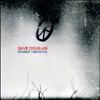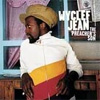
Comment
on this story
|
 |

Frisell steals, Wyclef spews, and Diabate and Rudd mix

Dave Douglas
Strange Liberation (Bluebird)
A pervasive aura is established by "A Single Sky," a gentle incantation for trumpet and tenor that broods over some conspicuous guitar playing. It's Bill Frisell, of course, who joins Douglas's quintet for the majority of the album, and who can't help stealing the show a bit. The subdued "Mountains from the Train" is built entirely on his delay-looping routine, and "Rock of Billy"—well, there you go. But it's mostly a tight fit: Frisell's back-porch twang and Uri Caine's oscillating Fender Rhodes make for a sort of rural/urban Americana dichotomy that echoes a quasi-patriotic sentiment in Douglas' liner notes.
The leader himself is typically fluid and surprising on trumpet, and his compositional range fascinates. From the old-school swing of "Skeeterism" to the labyrinthine throwdown "Seventeen," each piece investigates new emotional and formal territory, and it's a credit to the players that the material sounds as elastic as it does. "The Frisell Dream" has both a melodic charm appropriate to its honoree and enough modulations to keep the soloists limber, while the title track integrates involved ensemble work and bluesy modal passages. The fusion salvo "Catalyst" burns with a propulsive bassline, gripping horn chart, and SETI-transmission solos from Douglas, Frisell, and tenor ace Chris Potter.
Douglas has been dismissed by some in the neo-conservative critical camp, but this record defines the essence of jazz: thoughtful compositions, honest solos and compelling group interplay. It does come off lightweight in places, and yet it creates some moods you won't be able to find anywhere else.
—Chris Mitchell

Wyclef Jean
Preacher's Son (J Records)
Wyclef is one of the most prolific and talented songwriters in the industry today. Considering the rate at which he spews out releases, it is a wonder that he comes out with as many musical gems. Being that he also writes a good number of his songs with much abandon, to both stellar and somewhat-mediocre effect, it is a wonder he has not made a woefully inadequate album. Wyclef is a happy-go-lucky artist with a pensive side and a demonstration of this double-faceted musical personality is on full display on Preacher's Son.
In bringing on "the-peace," on the first cut, Wyclef wistfully orates his way through some of hip hop's tragedies, mindless distractions, and trivial pursuits. The mournful stain in his vocal delivery underscores the pain and drives home the pathos that is intrinsic to the all-too-often buffoonery that hip hop exhibits. Mr. Jean's "Baby Daddy" simultaneously addresses a timely and important topic while also coaxing one and all to improvise a line dance.
Also being an acutely nostalgic songwriter, Wyclef pens a killer ballad that is loaded with a falsetto vocal and chock-full of retro panache and daintiness. Wyclef also delivers a retrospective song with the help of an uncharacteristically subdued Patti LaBelle. A beautiful ballad about marital bliss, another that celebrates the Caribbean's flava, as well as a couple of other tracks that are of an Arabesque aesthetic gel well to make Preacher's Son a credible multi-genre musical statement.
—Ekem Amonoo Lartson

Roswell Rudd/Toumani Diabate
MALIcool (Universal)
For accessibility alone, MALIcool is not the CD one would expect from trombonist Roswell Rudd, best known for avant-garde jazz experiments and championing neglected '50s pianist/composer, Herbie Nichols. Adding further to the unexpected, on this recording Rudd's notoriously brazen trombone is combined with Toumani Diabate's kora, a West African stringed instrument, a union that at first blush suggests as much promise as a duet performance of the lute and mighty Wurlitzer...in a parking lot.
These incongruities and others to be mentioned aside, MALIcool nevertheless works, an experiment with a downright infectious outcome. Take a measure of the harpsichord-like kora, add a soupcan of ngone (fretless precursor to the banjo), and stir in healthy quantities of balophone (West African xylophone), djembe (conga), Rudd's smearing trombone, and the result is the first tune, "Bamako," a stunning cultural amalgam that, as with other tunes here, suggests a promising new jazz and world music fusion, fertile ground for further experimentation.
But while the original compositions "Bamako" and "Rosmani" (Toumani's tribute to Rudd, which includes Rudd's "talking" trombone) successfully negotiate the divide between Mali's seven and the Western twelve tone scales, more bizarre are Monk's "Jackie-ing," the traditional "All Through the Night," and Beethoven's "Ode to Joy," all included here as if to present further compositional challenges. The Monk and Beethoven work amazingly well; however, "All Through the Night," an Irish Christmas carol, is the recording's low point, a kind of exotically jazzed-up token, or perhaps an inside joke, a concession to the challenges otherwise hugely overcome elsewhere. Whatever the purpose of one particular tune, the other nine represent wholly successful rhythmic and melodic novelties not to be missed.
—Jonathan B. Frey

February 5, 2003 * Vol. 14, No. 6
© 2004 Metro Pulse
|